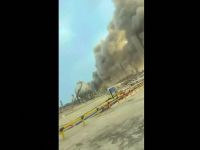Jordanian Prime Minister Ali Abu Ragheb on Tuesday announced the kingdom's first major petrol price hike in over a decade, saying the move would help shore up the country's ailing economy in line with recommendations by the International Monetary Fund (IMF), said reports.
He told reporters that the hike would bring in to the economy 45 million dinars annually ($63 million), and 23 million dinars ($32 million) by the end of the year.
The price of gasoline, regular, premium and unleaded, will go up by 14 to 15 percent, while gas will increase by 15 percent and diesel for heating by 3.8 percent.
The cost of public transport will also be raised, Abu Ragheb said, although he was not immediately able to say by how much, according to AFP.
The government had previously announced plans to raise fuel prices at the end of 2000 before suspending the move "temporarily."
According to government officials, the petrol hikes are still well below demands made by the IMF to raise petrol prices by 30 to 40 percent as part of efforts to maintain the budget deficit within a target of six percent of the Gross Domestic Product.
Jordan faces a budget deficit of $253 million for 2001.
"We had tough negotiations with the IMF and over the past three days we had more discussions with them and yesterday we agreed to increase some petroleum product," Abu Ragheb said, cited by the agency.
Six percent of the revenues that the government will earn from the increased petrol prices will be used to fund the desert kingdom's debt-ridden municipalities which face a budget deficit of 70 million dinars ($100 million), Abu Ragheb said.
Abu Ragheb insisted that the government decided against increasing fuel oil and other heavy duty petroleum products so as not to burden the industrial sector. The government also ruled out imposing increases on bread and electricity.
"We decided to restrict the increases in order to take into consideration the living conditions of Jordanians with limited income," Abu Ragheb said.
"The increases will not affect the economy of Jordan because it will not affect the price of bread, electricity, water, the trucking industry and therefore will not affect the lives of the limited income people," he said.
Albawaba.com sources said earlier that the rise would not be substantial.
However, a former Jordanian MP warned that such a move would lead to instability in the country, already stricken by poverty and unemployment.
In 1989, a hike in petrol prices led to riots in the southern part of Jordan, which according to the opposition prompted the return of the long-awaited parliamentary life.
Energy Minister Mohammad Batayneh earlier said that there was a need for a price hike due to rising oil prices worldwide.
The minister added that fuel prices remain lower in Jordan than "in neighboring countries, or even in oil-producing countries."
Jordan imports all of its oil from Iraq, amounting to some five million tons annually. Half of the amount is purchased at a bargain price, while the rest is delivered free of charge under a deal approved by the UN.
Jordan faces a budget deficit of $253 million for 2001 – Albawaba.com
© 2001 Al Bawaba (www.albawaba.com)







